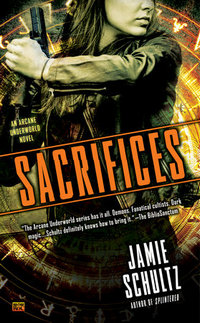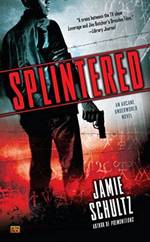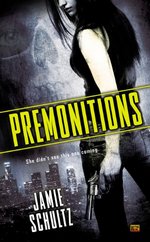 Sacrifices
Sacrifices
DETAILS: Series: Arcane Underworld, #3 Publisher: InterMix Publication Date: July 19, 2016 Format: eBook Length: 351 pg. Read Date: December 14-16, 2022

I look around, though, and I ain’t stupid. How’s this end? Just keep going like this forever? Naw. People gonna die.
What’s Sacrifices About?
That opening quote sums it up—the story, characters, and events of this trilogy can’t keep going. This ends—and not everyone is going to make it out alive. Maybe no one does.
After the end of Splintered, things were bleak—the team was, well, splintered. People were dead. Demons had infected (for lack of a better term) two of the team—and the biggest and most powerful one seemed to be working with the crime boss/would-be supernatural force that they’d been working so hard to get away from. But even Sobell didn’t seem to be fully in control and might be in danger from this demon.
This brings us to Sacrifices, Karyn had a vision/prophecy that gave hope that there was a way to defeat Belial. If they could just figure out what it said—of course, Belial heard it, too, and was at work to prevent anyone from fulfilling it. The FBI is lurking around—they may be willing to help, but are more interested in slapping the cuffs on Sobell and anyone else they could.
Now it’s just a matter of seeing what happens. Will their (literal and figurative) demons defeat them? Will Belial end up wreaking destruction on Los Angeles/the world? Will…actually, I don’t know if the reader—or any of the characters, actually—really gets a picture of the ultimate stakes here. I don’t think our minds could comprehend it—but it’s big, nasty, and possibly apocalyptic.
The solution to all this may lie in the fact that demons have an enemy. An enemy even more terrible and awful (especially if you look at older definitions of those words). But what will have to be given up to secure their presence?
I’m So Glad this Isn’t a Scratch ‘n Sniff Book
It came to her that this was the world as it really was, just thin tissue floating atop an unknowable black ocean teeming with horrifying, malicious creatures— creatures at the command of the demon before her. For the first time, she saw him as much greater than simply another enemy, if more revolting than most. For the first time she really understood that he was also unspeakably ancient and filled with knowledge and power beyond reckoning. This was the type of entity she dealt with each time she delved into magic
Some authors will mention the smell of sulfur or something like that and talk about rot and decay when talking about demons. Other authors will basically make demons out to be Byronic hunks (the Cullening of demons). Schultz does not do that—either of them. He dwells on the rot, the decay, the blood, grime, disease, and filth that comes with demonic possession, power, and or presence.
His demons aren’t misunderstood, they’re not occasionally benign or honorable, and there is nothing to them other than destruction and power—they may seemingly aid a human for a time, but it’s for a price. A price that no one should pay.
Schulz’s descriptions of the demonic effects—and just the life in L.A.’s heat for those without much in the way of resources—are so vivid that you feel a little grimy just reading it. From the description of the clear bottle that one man uses as a spittoon, bloody sweatpants that have been worn for days, various wounds, and so much more—Schulz makes sure that your visual images of these events are real and substantial.
A quick personal note
I’d fully intended on jumping on this book when it came out in 2016—and cannot tell you why I didn’t. It’s just been sitting there collecting dust on my Kindle since then—and it’s been so long at this point, I didn’t think I’d remember the story enough to make it worthwhile.
But within a few pages, I was right back—Schultz did a little bit of recapping, but not much. Mostly it was the tangibility of this world and these characters, just seeing them brought it all back to me, and it was like no time had passed at all. There are few authors that can pull that off, but he did it. And I’m impressed as all get out by that.
So, what did I think about Sacrifices?
“Funny, isn’t it? Lack of a demon isn’t usually a problem to be addressed. Quite the opposite.”
“I’m not laughing.”
Sobell made a clucking noise. “That’s your prerogative, but from my position, I’d have to say that if you don’t find any of this funny, you’ll find it unspeakably bleak.”
On the whole, this book is closer to the unspeakably bleak end of the spectrum, but there are a couple of moments of brightness (and maybe a little bit funny). And I do mean a couple of moments, a handful at best.
Even the more optimistic statements and moves come with the air of “This is probably not going to work, but it’s something to do.” The only characters that are operating without a sense of impending doom are those who are on the outside of the occult happenings in the city. The futility of every scheme, plan, and idea taints everything—but these people (and/or magical/spiritual entities) keep moving forward, scrabbling after the chance that someone will make it out alive. This is hard to read—I wasn’t even sure the planet would exist when the book ends—but once Schultz got his talons into your brain, there’s just no way that you stop reading—you have to know what’s around the corner, even if it will leave you despairing.
This is a great UF trilogy, and one that I am so sad that didn’t get the attention it deserved (including from me for the last 6 years). Pick up the set, you won’t be sorry.

![]()



 Last year’s Premonitions stuck with me more than many Urban Fantasies I’d consider equal to or better than it. For example: Seanan McGuire’s The Winter Long blew me away, but when I finished it, I thought about it for a couple of days and then moved on. But Schultz’ debut (which I thoroughly enjoyed) stuck around the back of my mind, and every so often I’d speculate about Karyn’s future, Genevieve’s motives, etc. Part of it was that is that McGuire’s got 7 novels of history in her series, I have (some) idea what she’ll be putting Toby et al. through in the future and had a solid idea about what had happened in The Winter Long. But Schultz is a question mark, who knew what he had up his sleeve for the future, and there were still some questions about what I’d read hanging in the back of my mind. But it was more than that — something about the book as a whole — the world as a whole — that lingered.
Last year’s Premonitions stuck with me more than many Urban Fantasies I’d consider equal to or better than it. For example: Seanan McGuire’s The Winter Long blew me away, but when I finished it, I thought about it for a couple of days and then moved on. But Schultz’ debut (which I thoroughly enjoyed) stuck around the back of my mind, and every so often I’d speculate about Karyn’s future, Genevieve’s motives, etc. Part of it was that is that McGuire’s got 7 novels of history in her series, I have (some) idea what she’ll be putting Toby et al. through in the future and had a solid idea about what had happened in The Winter Long. But Schultz is a question mark, who knew what he had up his sleeve for the future, and there were still some questions about what I’d read hanging in the back of my mind. But it was more than that — something about the book as a whole — the world as a whole — that lingered.
